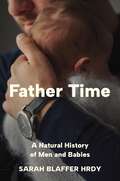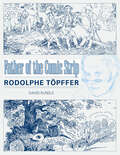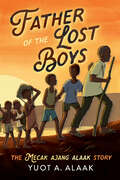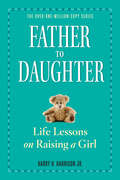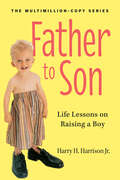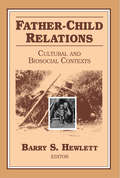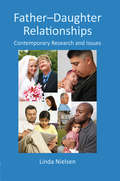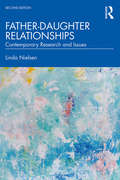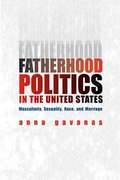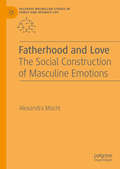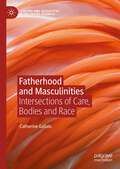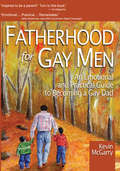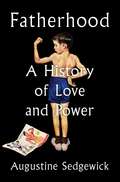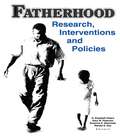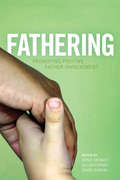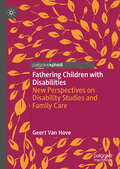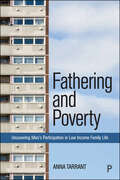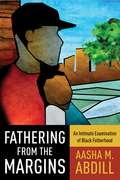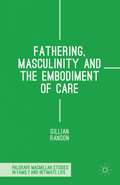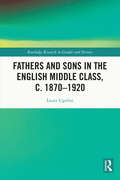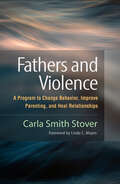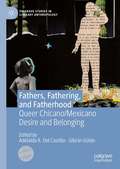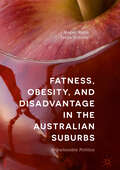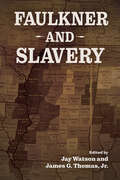- Table View
- List View
Father Time: A Natural History of Men and Babies
by Sarah Blaffer HrdyA sweeping account of male nurturing, explaining how and why men are biologically transformed when they care for babies It has long seemed self-evident that women care for babies and men do other things. Hasn&’t it always been so? When evolutionary science came along, it rubber-stamped this venerable division of labor: mammalian males evolved to compete for status and mates, while females were purpose-built to gestate, suckle, and otherwise nurture the victors&’ offspring. But come the twenty-first century, increasing numbers of men are tending babies, sometimes right from birth. How can this be happening? Puzzled and dazzled by the tender expertise of new fathers around the world—several in her own family—celebrated evolutionary anthropologist and primatologist Sarah Blaffer Hrdy set out to trace the deep history of male nurturing and explain a surprising departure from everything she had assumed to be &“normal.&”In Father Time, Hrdy draws on a wealth of research to argue that this ongoing transformation in men is not only cultural, but profoundly biological. Men in prolonged intimate contact with babies exhibit responses nearly identical to those in the bodies and brains of mothers. They develop caring potential few realized men possessed. In her quest to explain how men came to nurture babies, Hrdy travels back through millions of years of human, primate, and mammalian evolution, then back further still to the earliest vertebrates—all while taking into account recent economic and social trends and technological innovations and incorporating new findings from neuroscience, genetics, endocrinology, and more. The result is a masterful synthesis of evolutionary and historical perspectives that expands our understanding of what it means to be a man—and what the implications might be for society and our species.
Father of the Comic Strip: Rodolphe Töpffer (Great Comics Artists Series)
by David KunzleSixty years before the comics entered the American newspaper press, Rodolphe Töpffer of Geneva (1799–1846), schoolmaster, university professor, polemical journalist, art critic, landscape draftsman, and writer of fiction, travel tales, and social criticism, invented a new art form: the comic strip, or “picture story,” that is now the graphic novel. At first he resisted publishing what he called his “little follies.” When he did, they became instantly popular, plagiarized, and imitated throughout Europe and the United States. Töpffer developed a graphic style suited to his poor eyesight: the doodle, which he systematized and also theorized. The drawings, with their “modernist” spontaneous, flickering, broken lines, forming figures in mad hyperactivity, run above deft, ironic captions and propel narratives of surreal absurdity. The artist's maniacal protagonists mix social satire with myth. By the mid-nineteenth century, Messrs. Jabot, Festus, Cryptogame, and other members of the crazy family, comprising eight picture stories in all, were instant folk heroes. In a biographical framework, Kunzle situates the comic strips in the Genevan and European culture of the time as well as in relation to Töpffer's other work, notably his hilarious travel tales, and recounts their curious genesis (with an initial imprimatur from Goethe, no less) and their controversial success. Kunzle's study, the first in English on the writer-artist, accompanies Rodolphe Töpffer: The Complete Comic Strips, a facsimile edition of the strips themselves, with the first-ever translation of these into English.
Father of the Lost Boys for Younger Readers
by Yuot A. AlaakOnce, there was a man who rescued 20,000 boys from almost certain death. That man was my father. One of those boys was me. This is our story.During the Second Sudanese Civil War, thousands of boys were displaced or orphaned. In 1989, Mecak Ajang Alaak led the Lost Boys on a four-year journey from Ethiopia to Sudan to protect them from becoming child soldiers. This is the abridged account of that extraordinary true story.
Father to Daughter, Revised Edition: Life Lessons on Raising a Girl
by Harry H. Harrison Jr.Warm and fuzzy, anchored in values, and filled with simple words of wisdom, this beloved, bestselling book for parents speak to the important business of raising daughters, and distill their timeless lessons into one nugget of wisdom per page—some lighthearted, some serious, some practical, and some intangible, and all supported by a strong moral backbone.Freshly updated, the book begins with the Five Keys of Parenting, a guide to navigating the extraordinary, even if sometimes exasperating, journey of parenthood. It’s filled with helpful reassurance: Tickle her, play with her, give her piggyback rides. She’s not breakable. And accepting bittersweet reality: Prepare for the day when you’re not the most important man in her life.
Father to Son, Revised Edition: Life Lessons on Raising a Boy
by Harry H. Harrison Jr.Warm and fuzzy, anchored in values, and filled with simple words of wisdom, this beloved, bestselling book for parents speaks to the important business of raising sons, and distills their timeless lessons into one nugget of wisdom per page—some lighthearted, some serious, some practical, and some intangible, and all supported by a strong moral backbone.Freshly updated, the book begins with the Five Keys of Parenting, a guide to navigating the extraordinary, even if sometimes exasperating, journey of parenthood. It’s filled with the importance of nurturing responsibility: Teach him that the world will judge him by his actions, not his intentions. Fun stuff: Have tea with him in the afternoons. Serve cookies. And when he’s ready to go: Hug him fiercely.
Father-Child Relations: Cultural and Biosocial Contexts (Foundations Of Human Behavior Ser.)
by Barry S. HewlettDue to a greater involvement of American fathers in the direct care of their children in recent years, interest in the impact and nature of the father's role in nurturing children has increased. While studies about fathers in the industrialized, literate West have proliferated, little is known about the role of fathers in the preliterate, non-Western world. This collection examines the diversity of paternal roles found in human cultures among various types of societies that are very peaceful and those that actively engage in warfare as a mode of existence.Father-Child Relations recognizes the importance of understanding both biological and cultural aspects of the father's role. Many of the contributors utilize evolutionary or biosocial models, including those of developmental psychology, to examine the father's role, while others rely upon the symbolic analysis of cultural and social anthropology. One chapter is devoted to male-infant relationships in nonhuman primates, a further largely ignored comparative perspective.The anthropologists who have contributed to this collection are field workers who have lived intimately over significant periods of time with the people about whom they are writing. These research reports from the field have been edited to make them wholly accessible to the non-specialist. The contributors of this volume recognize that biology and ideology are intertwined; both together influence the father's behavior and the effects of his behavior.
Father-Daughter Relationships: Contemporary Research and Issues (Textbooks in Family Studies)
by Linda NielsenThe first research-based text that focuses on the impact of the father-daughter relationship, this provocative book examines the factors that can strengthen or weaken these relationships and the impact that these relationships have on society. The research is brought to life with compelling personal stories from fathers and daughters, including well-known celebrities and politicians. Controversial questions engage the reader and film lists and website resources demonstrate the relevance of the research. Boxed quizzes and questionnaires show students how the research can be applied to their own lives while others highlight the relationships between actual fathers and daughters. Bold faced terms, a conclusion, and review questions keep readers focused on the key concepts. How these relationships are often ignored or denigrated in the media and in some mental health and legal systems is examined. The hope is that readers will apply the research to their own families and/or work. The book addresses: What is "good" fathering? How do daughters influence their fathers' well-being? How do fathers affect their daughters' social, academic, athletic, and psychological development? How are problems such as depression, eating disorders, and teenage pregnancy related to the quality of these relationships? How are father-daughter relationships in ethnic and racial groups unique? How do incarceration, abuse, gay or lesbian relationships, military service, immigration, and poverty affect father-daughter relationships? The book opens with the importance of the father’s role on daughters and the changing patterns of these roles. Chapter 2 examines the myths and misconceptions of father-daughter relationships including how they are portrayed in the media and the differences between parenting styles. Chapter 3 explores the behaviors that constitute "good" fathering. Scales used to measure "good" fathering are included. How fathers affect their daughters’ social, academic, intellectual, athletic, and psychological development is then considered. Factors that can weaken father-daughter relationships, such as divorce, including various theoretical perspectives, are explored in chapters 5 and 6. Father-daughter relationships of racial or ethnic minorities and an array of potentially destructive situations that affect these relationships are the focus of chapters 7 and 8. The impact of fathers who are incarcerated, abusive, alcoholics, gay, or sperm donors are considered. The book concludes with suggestions on where we go from here. Intended as a supplemental text for upper-level undergraduate or graduate courses on father-daughter relationships and/or parenting taught in human development, family studies, psychology, sociology, counseling, social work, and women’s studies, this practical book also appeals to mental health practitioners, social workers, legal professionals, and school counselors interested in these relationships.
Father-Daughter Relationships: Contemporary Research and Issues (Textbooks in Family Studies)
by Linda NielsenIn this fully revised new edition, Father-Daughter Relationships: Contemporary Research and Issues summarises and analyses the most relevant research regarding father-daughter relationships, aiming to break down the persistent misconceptions regarding fatherhood and father-daughter relationships and encourage the reader to take a more objective and analytical approach. The research is brought to life with compelling personal stories from fathers and daughters, including well-known celebrities and politicians. Boxed quizzes and questionnaires show students how the research can be applied to their own lives while others highlight the relationships between real-life fathers and daughters. Nielsen discusses the father-daughter relationship within a diverse range of family structures, including divorced and separated parents, gay parents, adopted children and children of sperm donors. Covering a wide range of topics, including the father’s impact on his daughter’s cognitive, academic, social and physical wellbeing, ethnic minorities, and incarcerated or abusive fathers, Father-Daughter Relationships: Contemporary Research and Issues gives panoramic view of the most recent research and statistics. This book is essential reading for upper level undergraduate and for graduate students, as well as for practitioners working with families, such as social workers, mental health professionals and family counsellors. It is especially relevant for courses in psychology, sociology, women’s studies, and counselling. Linda Nielsen is a Professor of Adolescent and Educational Psychology at Wake Forest University. A member of the faculty for 35 years, she is a nationally recognized expert on father-daughter relationships.
Fatherhood Politics in the United States: Masculinity, Sexuality, Race, and Marriage
by Anna GavanasAre fathers being marginalized in the contemporary family? Responding to fears that they are, the self-proclaimed "fatherhood responsibility movement" (FRM) has worked since the mid-1990s to put fatherhood at the center of U.S. national politics. Anna Gavanas's Fatherhood Politics in the United States analyzes the processes, reveals the internal struggles, and traces the myths that drive this powerful movement. Unlike previous investigations that rely on literary or other secondary sources, Fatherhood Politics works from primary ethnographic material to represent a wider range of voices and actors. Interacting with and interviewing members of the most powerful and well-known national fatherhood organizations, Gavanas observed Promise Keeper rallies, men's workshops, and conferences on masculinity, fatherhood, and marriage. Providing a detailed overview of the different organizations involved and their various rhetorical strategies, Gavanas breaks down the FRM into two major wings. The "pro-marriage" wing sees marriage as the key to solving all social problems, while the "fragile family" organizations worry about unemployment, racism, and discrimination. Gavanas uses her extensive anthropological fieldwork as the basis for discussions of gender, sexuality, and race in her analysis of these competing voices. Taking us inside the internal struggles, tensions, and political machinations of the FRM, Gavanas offers a behind-the-scenes look at a movement having real impact on current social policy. Fatherhood Politics is an essential work for anyone interested in the politics of masculinity, parenthood, marriage, race, and sexuality.
Fatherhood and Love: The Social Construction of Masculine Emotions (Palgrave Macmillan Studies in Family and Intimate Life)
by Alexandra MachtThis book explores how contemporary men understand love in the realm of family life and how they integrate it into their identity. Drawing from Ian Burkitt’s aesthetic theory of emotions, Macht presents rich data from qualitative interviews and observations with Scottish and Romanian involved fathers, to reveal how they maintain closeness to their children, their partners and their own family of origin. Reflecting on distances, separations, power, worry and intergenerational experiences of love Fatherhood and Love hypothesizes that fathers’ identities and emotionality rely on a variety of social relationships in their intimate environment. A new concept, ‘emotional bordering’, is introduced, to portray the tensions inherent in fathers’ identities and illuminate why gender progress happens slowly. Engaging with literature on love, masculinity, culture and father’s involvement from a unique perspective, this book will be of interest to students and scholars across a range of social science disciplines.
Fatherhood and Masculinities: Intersections of Care, Bodies and Race (Genders and Sexualities in the Social Sciences)
by Catherine GallaisBased on novel ethnographic research conducted in New York City, this book explores through the lens of intersectionality how gender impacts men’s experiences of full-time fatherhood, as well as how sexuality, race, class, faith, and so on result in unequal access to choices and opportunities as parents. Chapters analyze how perspectives on caregiving are complicated by varying cultural, gendered, and racialized stereotypes and representations that pull different fathers toward or push them away from particular models of fatherhood in an urban context. Additionally, the author interrogates how societal conceptions of men’s bodies also play a role in how men understand their experiences of fatherhood. This book will be of interest to scholars and students studying gender, masculinity, and fatherhood.
Fatherhood and the British Working Class, 1865-1914
by Julie-Marie StrangeA pioneering study of Victorian and Edwardian fatherhood, investigating what being, and having, a father meant to working-class people. Based on working-class autobiography, the book challenges dominant assumptions about absent or 'feckless' fathers, and reintegrates the paternal figure within the emotional life of families. Locating autobiography within broader social and cultural commentary, Julie-Marie Strange considers material culture, everyday practice, obligation, duty and comedy as sites for the development and expression of complex emotional lives. Emphasising the importance of separating men as husbands from men as fathers, Strange explores how emotional ties were formed between fathers and their children, the models of fatherhood available to working-class men, and the ways in which fathers interacted with children inside and outside the home. She explodes the myth that working-class interiorities are inaccessible or unrecoverable, and locates life stories in the context of other sources, including social surveys, visual culture and popular fiction.
Fatherhood for Gay Men: An Emotional and Practical Guide to Becoming a Gay Dad (Race and Politics)
by Kevin McgarryGet the inside story on a single gay man's struggle to adopt! Fatherhood for Gay Men: An Emotional and Practical Guide to Becoming a Gay Dad is the story of one man's journey down the road less traveled-a single gay man adopting and raising his two sons. Author Kevin McGarry recounts his passage into parenthood after years of having his natural fathering instincts stifled by the limits-real and perceived-of being gay. This unique book details the emotional, financial, practical, and social realities of the adoption process for gay men. From the author: "We take risks by coming out of the closet as gay men and at the end of the day, we are emotionally happier because we took those risks. By coming out, we are being true to who we are. The same goes for anyone, gay or straight, who has gut instincts for parenthood. I knew over the years that I had parenting instincts because I had this incredible envy of other dads. I would watch them with their kids and wish that somehow, I could have that role. It was painful at times because being gay, I didn't think parenting was in my life plan. Had more role models been available to me, the process would have been a little less difficult." Much more than a "how-to" guide to adoption, Fatherhood for Gay Men is the personal account of a single gay man's struggle to become a father despite the real and imagined limitations of being a gay man. The book looks at the adoption process (domestic and international) from the inside, providing unique insight into: conducting a homestudy costs (fees and expenses) what countries allow men to adopt alternatives to adoption life as a new parent online resources and a state-by-state review of adoption laws, categorized by "Completely Legal," "Favorable Climate," "Mixed Success," and "Illegal" The book also includes results of the 2000 study by Gillian Dunne, senior researcher for the London School of Economics Gender Institute, of 100 gay fathers and fathers-to-be. "Fatherhood for Gay Men: An Emotional and Practical Guide to Becoming a Gay Dad is a heartfelt and heartwarming story of a father's refusal to be denied a family.Visit the Author's Web site at http://www.fatherhoodforgaymen.com
Fatherhood: A History of Love and Power
by Augustine Sedgewick&“Superbly intelligent…[a] rewarding Sapiens-style big history.&” —The Times (London) A bold and original history of fatherhood, exploring its invention and transformation from the Bronze Age to the present through a collective portrait of emblematic fathers who have helped to define how the world should be ruled and what it means to be a man.Fatherhood is one of the most meaningful aspects of human culture, but we know little about when or where fatherhood first emerged, or even how or why. Despite its enigmatic beginnings, fatherhood has, for centuries, given shape to ideas about the world, defined human experiences, and provided the foundation of patriarchy. The history of fatherhood is not just the story of one of humanity&’s great values: caring for those who cannot care for themselves. And it is not merely the story of patriarchy—&“the power of fathers&”—which is arguably the oldest and most widespread form of social hierarchy and political oppression. It is the story of how these twin strands of history became so entangled that they are often indistinguishable. In Fatherhood, celebrated historian Augustine Sedgewick explains how this style of parenting emerged in the first place, why it has changed over time, and whether it will endure as we know it, despite its extraordinary costs. Told through the lives of emblematic fathers like Aristotle, Saint Augustine, Henry VIII, Thomas Jefferson, Charles Darwin, and Sigmund Freud, this is an ambitious yet intimate look at how masculinity has evolved and how men have come to hold disproportionate power by expanding and reinforcing the power of fathers in times of crisis. Sedgewick, acclaimed for his &“literary gifts and prodigious research&” (The Atlantic), takes us from the Bronze Age to the present to revolutionize our understanding of fathers and challenge the fictions that have surrounded them for centuries. Fatherhood transforms our understanding of this fundamental idea, experience, and institution, allowing us to better know our past and re-envision our common future.
Fatherhood: Research, Interventions, and Policies
by H. Elizabeth Peters Gary W Peterson Suzanne Steinmetz Randal D DayHow much power does a father have to influence his children's development? A lively and often heated public debate on the role and value of the father in a family has been underway in the United States for the past decade. Nevertheless, we are far from understanding the complex ways in which fathers make contributions to their families and children. Fatherhood: Research, Interventions, and Policies addresses the central questions of the role of fathers: What is the impact of father involvement on child outcomes? What factors predict increased involvement of fathers?Bringing together papers presented at the Conference on Father Involvement, this volume includes contributions by leading scholars in anthropology, demography, economics, family science, psychology, and sociology. Many of the contributors also address the implications of father involvement for family policy issues, including family leave, child care, and child support. Furthermore, the discussion of fatherhood ranges well beyond the case of intact, middle-class, white families to include fathers from various ethnic groups and socioeconomic classes and of varied marital status, including fathers of nonmarital children, single-father families, and nonresident fathers. Fatherhood: Research, Interventions, and Policies addresses both practical and theoretical concerns, including:the redefinition of fatherhood changes over time in research on fatherhood the predictive power of fathers’activities on their children's adult outcomes the correlation between fathers’income and their involvement with their nonmarital children the influence of fathers on their sons’probability of growing up to become responsible fathers the effects of divorce on father-son and father-daughter relationships interventions that help to keep divorced fathers in touch with their childrenThis comprehensive, powerful book combines pioneering empirical research with thoughtful consideration of the social and psychological implications of fatherhood. It is essential reading for researchers, policymakers, psychologists, and students of family studies, human development, gender studies, social policy, sociology, and human ecology.
Fathering
by Annie Devault Gilles Forget Diane DubeauIn the past few decades, researchers and practitioners have moved away from the idea of fatherhood as a single, monolithic concept. Examining the challenges of vulnerable fathers such as those in poverty or in prison, they have developed valuable new strategies for cultivating the positive involvement of fathers in the lives of their children.Drawing on the innovative work of Prospère, a Quebec organization that brought together fathers, university researchers, and health and social service practitioners, Fathering details innovative approaches that support positive father involvement. It provides numerous examples of strategies and interventions with fathers, lessons learned from these practices on how to better support vulnerable fathers and families, and in-depth information on ways of designing, implementing, evaluating, and disseminating the results of participatory action research (PAR) - a methodology which put fathers at the heart of the project's decision-making.
Fathering Children with Disabilities: New Perspectives on Disability Studies and Family Care
by Geert Van HoveThis book explores the often-forgotten role of fathers of children with disabilities. Bridging the gap between disability studies, family studies, and gender studies, it uncovers men's perspective on caring for children with disabilities and presents examples of famous fathers, such as general Charles de Gaulle, film director Dan Habib, and scholars Michael Bérubé and Phil Ferguson. Drawing on interviews with fathers of children with disabilities, the author explores what makes a father a 'good father' and presents fatherhood as an intense and dynamic journey of discovery, experienced together with the children, as a process of ‘becoming with’. The testimonies offer an insight into the lived experience of fathers and challenge the model of caring masculinity through a narrative approach, with the aim to answer burning questions: can we built research lines around the experiences of fathers? can we secure the father perspective within family research and within support services for families with children with disabilities? A must read for academics in social science, education, and medical fields.
Fathering and Poverty: Uncovering Men’s Participation in Low-Income Family Life
by Anna TarrantAnna Tarrant’s revealing research explores the dynamics of men’s caring responsibilities in low-income families’ lives. The book draws on pioneering multigenerational research to examine men’s involvement in care for their families. It interrogates how this is affected by the resources available and the constraints upon them, considering intersections of gender, generation and work, as well as the impact of austerity and welfare support. Illuminating aspects of care within economic hardship that often go unseen, it deepens our understanding of masculinities and family life and the policies and practices that support or undermine men’s participation.
Fathering from the Margins: An Intimate Examination of Black Fatherhood
by Aasha M. AbdillDespite a decade of sociological research documenting black fathers’ significant level of engagement with their children, stereotypes of black men as “deadbeat dads” still shape popular perceptions and scholarly discourse. In Fathering from the Margins, sociologist Aasha M. Abdill draws on four years of fieldwork in low-income, predominantly black Bedford-Stuyvesant, Brooklyn, to dispel these destructive assumptions. She considers the obstacles faced—and the strategies used—by black men with children.Abdill presents qualitative and quantitative evidence that confirms the increasing presence of black fathers in their communities, arguing that changing social norms about gender roles in black families have shifted fathering behaviors. Black men in communities such as Bed-Stuy still face social and structural disadvantages, including disproportionate unemployment and incarceration, with significant implications for family life. Against this backdrop, black fathers attempt to reconcile contradictory beliefs about what makes one a good father and what makes one a respected man by developing different strategies for expressing affection and providing parental support. Black men’s involvement with their children is affected by the attitudes of their peers, the media, and especially the women of their families and communities: from the grandmothers who often become gatekeepers to involvement in a child’s life to the female-dominated sectors of childcare, primary school, and family-service provision. Abdill shows how supporting black men in their quest to be—and be seen as—family men is the key to securing not only their children's well-being but also their own.
Fathering, Masculinity and the Embodiment of Care (Palgrave Macmillan Studies in Family and Intimate Life)
by Gillian RansonMany fathers are now providing hands-on, engaged care to babies and young children. This book draws on observations of, and interviews with, caregiving fathers, as well as analyses of fathers' memoirs and online blogs, to examine fathers' caregiving work as embodied practice and as lived experience.
Fathers and Sons in the English Middle Class, c. 1870–1920 (Routledge Research in Gender and History #43)
by Laura UgoliniThis book explores the relationship between middle-class fathers and sons in England between c. 1870 and 1920. We now know that the conventional image of the middle-class paterfamilias of this period as cold and authoritarian is too simplistic, but there is still much to be discovered about relationships in middle-class families. Paying especial attention to gender and masculinities, this book focuses on the interactions between fathers and sons, exploring how relationships developed and masculine identities were negotiated from infancy and childhood to adulthood and old age. Drawing on sources as diverse as autobiographies, oral history interviews, First World War conscription records and press reports of violent incidents, this book questions how fathers and sons negotiated relationships marked by shifting relations of power, as well as by different combinations of emotional entanglements, obligations and ties. It explores changes as fathers and sons grew older and assesses fathers’ role in trying to mould sons’ masculine identities, characters and lives. It reveals negotiation and compromise, as well as rebellion and conflict, underlining that fathers and sons were important to each other, their relationships a significant – if often overlooked – aspect of middle-class men’s lives and identities.
Fathers and Violence: A Program to Change Behavior, Improve Parenting, and Heal Relationships
by Carla Smith StoverThis highly accessible book presents a new approach to treating men who use violence against their partners and/or children. The Fathers for Change (F4C) program has a unique focus on fostering fathers' accountability and reflective functioning, and repairing father–child relationships. Grounded in theory and research, it addresses a key need for parents who want to stay together or coparent successfully in the aftermath of violence, while prioritizing all family members' safety. Clinicians learn how to implement each component of F4C, from assessment to individual-focused work to coparent and family sessions, if appropriate. Illustrative case vignettes are featured throughout. An appendix provides 32 reproducible forms, worksheets, and handouts that can be downloaded (many in a fillable format) and printed as needed.
Fathers, Fathering, and Fatherhood: Queer Chicano/Mexicano Desire and Belonging (Palgrave Studies in Literary Anthropology)
by Adelaida R. Del Castillo Gibrán GüidoBringing together a unique collection of narrative accounts based on the lived experience of queer Chicano/Mexicano sons, this book explores fathers, fathering, and fatherhood. In many ways, the contributors reveal the significance of fathering and representations of fatherhood in the context of queer male sexuality and identity across generations, cultures, class, and Mexican immigrant and Mexican American families. They further reveal how father figures—godfathers, grandfathers, and others—may nurture and express love and hope for the queer young men in their extended family. Divided into six sections, the book addresses the complexity of father-queer son relationships; family dynamics; the impact of neurodiverse mental health issues; the erotic, unsafe, and taboo qualities of desire; encounters with absent, estranged or emotionally distant fathers; and a critical analysis of father and queer son relationships in Chicano/Latino literature and film.
Fatness, Obesity, and Disadvantage in the Australian Suburbs: Unpalatable Politics
by Megan Warin Tanya ZivkovicThis ethnography takes the reader into the Australian suburbs to learn about food, eating and bodies during the highly political context of one of Australia’s largest childhood obesity interventions. While there is ample evidence about the number of people who are overweight or obese and an abundance of information about what and how to eat, obesity remains ‘a problem’ in high-income countries such as Australia. Rather than rely on common assumptions that people are making all the wrong choices, this volume reveals the challenges of ‘eating healthy’ when money is scarce and how, different versions of being fat and doing fat happen in everyday worlds of precarity. Without acknowledgement of the multiple realities of fatness and obesity, interventions will continue to have limited reach.
Faulkner and Slavery (Faulkner and Yoknapatawpha Series)
by Jay Watson and James G. ThomasContributions by Tim Armstrong, Edward A. Chappell, W. Ralph Eubanks, Amy A. Foley, Michael Gorra, Sherita L. Johnson, Andrew B. Leiter, John T. Matthews, Julie Beth Napolin, Erin Penner, Stephanie Rountree, Julia Stern, Jay Watson, and Randall WilhelmIn 1930, the same year he moved into Rowan Oak, a slave-built former plantation home in his hometown of Oxford, Mississippi, William Faulkner published his first work of fiction that gave serious attention to the experience and perspective of an enslaved individual. For the next two decades, Faulkner repeatedly returned to the theme of slavery and to the figures of enslaved people in his fiction, probing the racial, economic, and political contours of his region, nation, and hemisphere in work such as The Sound and the Fury; Light in August; Absalom, Absalom!; and Go Down, Moses.Faulkner and Slavery is the first collection to address the myriad legacies of African chattel slavery in the writings and personal history of one of the twentieth century’s most incisive authors on US slavery and the long ordeal of race in the Americas. Contributors to the volume examine the constitutive links among slavery, capitalism, and modernity across Faulkner’s oeuvre. They study how the history of slavery at the University of Mississippi informs writings like Absalom, Absalom! and trace how slavery’s topologies of the rectilinear grid or square run up against the more reparative geography of the oval in Faulkner’s narratives. Contributors explore how the legacies of slavery literally sound and resound across centuries of history, and across multiple novels and stories in Faulkner’s fictional county of Yoknapatawpha, and they reveal how the author’s remodeling work on his own residence brought him into an uncomfortable engagement with the spatial and architectural legacies of chattel slavery in north Mississippi. Faulkner and Slavery offers a timely intervention not only in the critical study of the writer’s work but in ongoing national and global conversations about the afterlives of slavery and the necessary work of antiracism.
